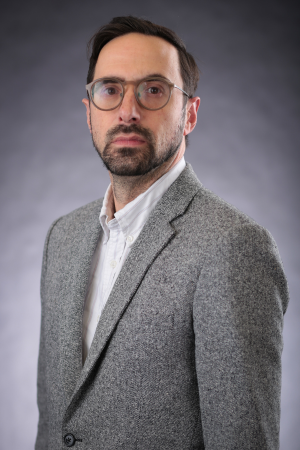How We Come to Believe: Dr. Fardy’s Book on Ideology and Interpellation

Dr. Jonathan Fardy’s new book, Ideology and Interpellation: Anti-Humanism to Non-Philosophy, explores how we come to adopt beliefs
Elisabeth Curtis
May 29, 2025
A new book from ISU’s Dr. Jonathan Fardy examines ideology through the lens of French philosophy.
Dr. Jonathan Fardy, Chair and Associate Professor of Art at Idaho State University (ISU), has published a new book titled Ideology and Interpellation: Anti-Humanism to Non-Philosophy.
The book explores how people come to believe certain ideas and how those beliefs are shaped by society. This process, known as ideological interpellation, is central to the work. “Ideological interpellation is, put briefly, a process by which one comes to identify with a certain set of beliefs,” Dr. Fardy explains.
Drawing on major French thinkers from the 1960s to today, including Louis Althusser, Jacques Rancière, Jean Baudrillard, and François Laruelle, Fardy examines how their ideas shaped and challenged our understanding of ideology. “Epistemology asks questions like: what is knowledge? And how do we get knowledge?” he adds. “Interpellation is a way of explaining how we come to identify with certain forms of political knowledge.”
Designed for both new and experienced readers of philosophy, the book offers a clear and structured look at each philosopher’s contribution. “I hope that it piques the reader’s interest in this theoretical tradition,” said Fardy. “What the Anglophone world calls “French theory” continues to have a wide impact on theoretical approaches in a variety of fields, including literary studies, art, and other disciplines.”
Dr. Fardy has been asked to write a special piece for the journal Philosophy of Photography to honor François Laruelle, a philosopher he has studied deeply, and whom Fardy expresses is the heart of Ideology and Interpellation.
“Laruelle has been a constant interest of mine,” Fardy says. “His work is difficult, enigmatic, but so rich and rewarding all the same. I think that Laruelle has really opened philosophy, at least Continental philosophy, in a new way that has democratized what is meant by philosophy and for whom it speaks.”
Additionally, Dr. Fardy is working on two new book projects: one on new ways to approach formalist criticism and an edited volume on aesthetics and politics. Through his writing, Dr. Fardy hopes to help people better understand how we form beliefs and how philosophy can help us think more clearly about the world around us.


